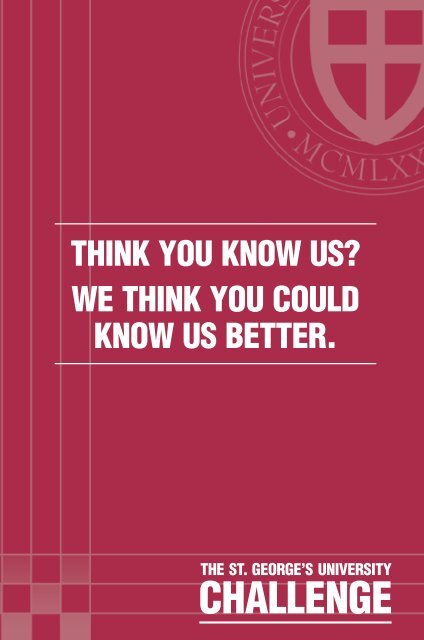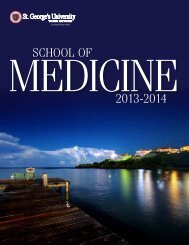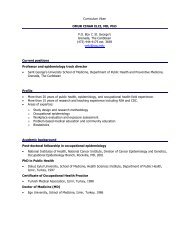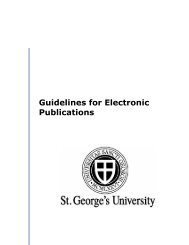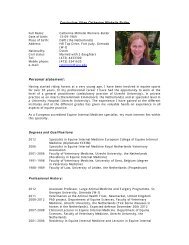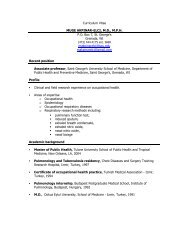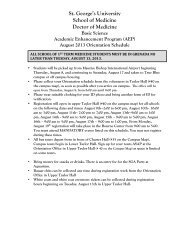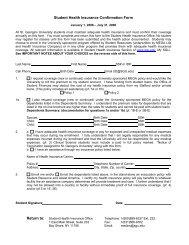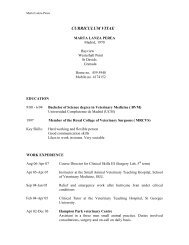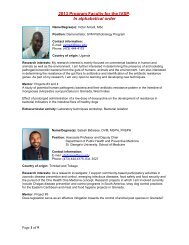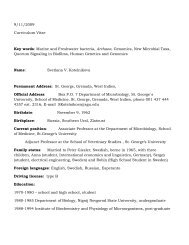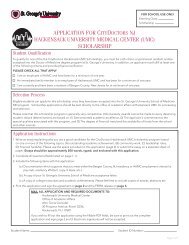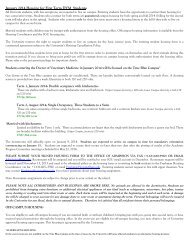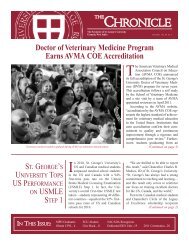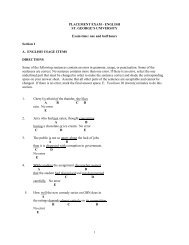29063 FAQBrch - St. George's University
29063 FAQBrch - St. George's University
29063 FAQBrch - St. George's University
Create successful ePaper yourself
Turn your PDF publications into a flip-book with our unique Google optimized e-Paper software.
THINK YOU KNOW US?<br />
WE THINK YOU COULD<br />
KNOW US BETTER.<br />
THE ST. GEORGE’S UNIVERSITY<br />
CHALLENGE
Presenting the answers to the<br />
most frequently asked questions<br />
students like you have about us.<br />
You’re about to discover more about <strong>St</strong>. George’s <strong>University</strong><br />
than you may have ever thought to ask. In this publication we<br />
have taken the challenge of answering the biggest questions<br />
asked about our academic programs, campus facilities and life<br />
in Grenada. The brochure covers a wide range of topics such<br />
as curriculum, admissions, financial aid, student support,<br />
local climate and more. If your question isn’t answered here,<br />
give us a call. We are up to the challenge of answering the<br />
toughest questions students ask when investigating medical<br />
education options.
WHAT WILL MY<br />
ST. GEORGE’S<br />
EXPERIENCE<br />
BE LIKE?
?ANSWERING YOUR<br />
SCHOOL OF MEDICINE<br />
AND GRADUATE PROGRAM<br />
QUESTIONS
ACADEMIC CHALLENGE<br />
Why has <strong>St</strong>. George’s <strong>University</strong> gained such a<br />
good reputation?<br />
<strong>St</strong>. George’s <strong>University</strong>’s graduates have practiced medicine in over<br />
35 countries. They also practice in virtually every subspecialty and<br />
frequently hold academic medicine positions in US and other<br />
medical schools.<br />
All external organizations that have conducted formal reviews with<br />
site visits of the medical program at <strong>St</strong>. George’s <strong>University</strong> have<br />
given their approval. <strong>St</strong>ate Education Departments across the United<br />
<strong>St</strong>ates and various Government Councils around the world have<br />
evaluated the program, and <strong>St</strong>. George’s <strong>University</strong> has received a<br />
favorable review each time, meeting or exceeding all standards.<br />
In 1996, the US Department of Education reviewed the standards of<br />
medical education in 30 countries for the purpose of student loans.<br />
Grenada was one of four countries approved during the initial review;<br />
the United Kingdom, Australia and Canada were the other three.<br />
Other countries have subsequently been approved.<br />
In 1996, a US state medical licensure board, in its official report,<br />
described <strong>St</strong>. George’s <strong>University</strong> as the “premier institution in the<br />
Caribbean which easily compares to most medical schools in the United<br />
<strong>St</strong>ates.” <strong>St</strong>. George’s <strong>University</strong> has a strong clinical program, consisting<br />
of over 50 affiliated hospitals, some unified into clinical centers, which<br />
offer students a cohesive and progressive program of clinical education.<br />
3
100%<br />
95%<br />
90%<br />
85%<br />
80%<br />
75%<br />
70%<br />
65%<br />
60%<br />
55%<br />
50%<br />
USMLE <strong>St</strong>ep 1 First Time Test Takers – Six Year Comparison<br />
1997 1998 1999 2000 2001 2002<br />
US/Canada Schools<br />
SGU/US/Canada Schools<br />
Foreign Schools<br />
We have a five-year average pass rate of 90% for first time USMLE <strong>St</strong>ep 1 Examinees.<br />
The average pass rate* during the same period for all non-U.S. schools was 62%.<br />
*Published, 2001 NMBE Annual Report, Copyright 2002 NMBE.<br />
How do <strong>St</strong>. George’s <strong>University</strong>’s students fare on external<br />
examinations?<br />
<strong>St</strong>. George’s <strong>University</strong> has a 5-year average pass rate of 90% for first-time<br />
USMLE <strong>St</strong>ep 1 examinees, far exceeding the 62% average pass rate of all<br />
non-US schools during the same period.<br />
What is the average class size?<br />
Approximately 325 new students matriculate each term (August and January).<br />
4
Who will teach me in the basic science years?<br />
One of the major strengths of our faculty, besides their credentials and<br />
commitment to teaching, is the length of their service at the School of Medicine.<br />
Many have taught at <strong>St</strong>. George’s <strong>University</strong> School of Medicine for more than<br />
half of the School’s existence; some have been here from the beginning.<br />
This has engendered a continuity and progression of curriculum and program<br />
development. Teaching is the major concern of the faculty, although research<br />
projects are ongoing on the campus. The student: faculty ratio is 9:1 in the<br />
basic sciences.<br />
How long will it take me to complete the medical program?<br />
Four Years. The medical program is generally completed in four calendar years.<br />
Those who matriculate in Fall 2004 will graduate in Spring 2008. The structure<br />
of the program is one of five academic years broken down into 30 to 35 weeks<br />
each. <strong>St</strong>udents spend two calendar years in the West Indies, completing their<br />
basic sciences, and continue on to two years of clinical training at our affiliated<br />
hospitals in the US, the UK or the Caribbean. <strong>St</strong>udents who pursue the<br />
dual-degrees offered in Public Health (MD/MPH) or Research (MD/MSc) will<br />
spend at least one extra term of study during their basic science years.<br />
Why is <strong>St</strong>. George’s clinical training superior to that of<br />
other non-US medical schools?<br />
Unlike schools that put students in any open clinical spots available,<br />
<strong>St</strong>. George’s offers a highly integrated system of affiliated hospitals and Clinical<br />
Centers, all of whose core rotations have ACGME-approved residency training<br />
programs running concurrently.<br />
5
Why is it important to look for concurrent ACGME-approved<br />
residency training programs?<br />
Many key states in the United <strong>St</strong>ates will not license graduates of non-US<br />
schools if any of their core rotations were done at hospitals without concurrent<br />
ACGME-approved residency training programs. Our program in the United<br />
Kingdom is similar to that in the United <strong>St</strong>ates.<br />
Do I have to do rotations in the US, the UK and<br />
the Caribbean?<br />
<strong>St</strong>. George’s clinical training program provides many options to our students.<br />
Our wide variety of clinical training sites include Clinical Centers (large<br />
programs where students may elect to stay for their entire clinical training)<br />
and a number of smaller, affiliated hospital programs in places like California,<br />
Florida, and Michigan. Although our students may elect to complete their<br />
clinical training in one Clinical Center, hospital or country, those students who<br />
choose to take advantage of all that <strong>St</strong>. George’s has to offer will benefit from<br />
exposure to the breadth of medicine as it is practiced and taught in the<br />
Caribbean, the United <strong>St</strong>ates and the United Kingdom.<br />
Do I have to find my own clinical rotations?<br />
Each and every one of our clinical students is placed by our Office of Clinical<br />
<strong>St</strong>udies after deciding what his/her preferences are for clinical training location.<br />
Each student is then shepherded through training by a dedicated team of<br />
long-term faculty members in a cohesive and structured medical program.<br />
All of our hospital and Clinical Center affiliations are led by an on-site Director<br />
of Medical Education and a Clerkship Director in each core rotation. This<br />
educational program results in a 99% US residency placement rate for our<br />
eligible US graduates.<br />
What is the attrition rate?<br />
Our attrition rate in the first two years is generally 1–2% for personal reasons<br />
and 3–5% for academic reasons. The attrition rate in the final two years is<br />
almost negligible.<br />
6
Can I transfer into <strong>St</strong>. George’s <strong>University</strong>?<br />
<strong>St</strong>. George’s <strong>University</strong> does not seek, and rarely accepts, advanced standing<br />
students. Candidates must write a letter to the Board of Admissions, which will<br />
then determine if the candidate will be allowed to apply for admission with<br />
advanced standing. Advanced standing is not granted beyond the beginning<br />
of the second year.<br />
Can I transfer from <strong>St</strong>. George’s <strong>University</strong> to a<br />
US medical school?<br />
The chances of transferring to a US medical school from <strong>St</strong>. George’s<br />
<strong>University</strong> range from 5-15%. Due to full US enrollment, there are few<br />
seats for advanced standing students available in US medical schools.<br />
While <strong>St</strong>. George’s <strong>University</strong>’s students often obtain those available seats,<br />
and the faculty and administration will happily support transfer applications,<br />
you should not enter <strong>St</strong>. George’s <strong>University</strong> School of Medicine with the<br />
assumption that you can transfer to a US medical school.<br />
What opportunities exist to pursue additional<br />
graduate studies while at SGU?<br />
In addition to our Masters in Public Health and Masters of Science, we offer<br />
medical students the opportunity to pursue a combined MD/MPH or MD/MSc<br />
degree. Our Masters in Science allows students to pursue original, thesisoriented<br />
research generally done in the areas of epidemiology, ecology,<br />
neuroscience, bioethics, microbiology, immunology, and tropical medicine.<br />
Medical students can also do a combined MD/MSc in clinical anatomy and<br />
education. We also offer a stand-alone MSc and PhD in clinical anatomy and<br />
education and microbiology. The microbiology programs offer concentration<br />
in clinical microbiology, marine microbiology, parasitology, mycology,<br />
immunology and virology.<br />
7
???<br />
???<br />
???<br />
Family Practice 12% Psychiatry 2%<br />
Anesthesiology 2%<br />
Emergency Medicine 5%<br />
Pathology 1%<br />
General Surgery 13%<br />
Internal Medicine/Pediatrics (2%) Internal Medicine/<br />
Radiology-Diagnostics (1%) Emergency Medicine (0.34%)<br />
Neurology (1%) Anesthesiology (5%)<br />
Psychiatry (4%)<br />
Emergency Medicine (4%)<br />
Pediatrics (15%)<br />
Physical Medicine<br />
Family Practice (11%)<br />
& Rehabilitation (0.33%)<br />
Critical Care<br />
Medicine (0.33%)<br />
Obstetrics & Gynecology (7%)<br />
Pathology (1%)<br />
Orthopaedic Surgery (1%)<br />
Internal Medicine/<br />
Psychiatry (0.33%)<br />
Ophthalmology (0.33%)<br />
Internal Medicine (40%)<br />
May/June 2003<br />
Radiology-Diagnostic 1%<br />
Pediatrics 14%<br />
Orthopaedic<br />
Surgery 1%<br />
General Surgery (6%)<br />
Pediatrics/Emergency<br />
Medicine (0.34%)<br />
Internal Medicine<br />
Pediatrics 2%<br />
???<br />
Postgraduate Appointments<br />
Obstetrics/Gynecology 7%<br />
Physical Medicine & Rehabilitation 1%<br />
May/June 2004<br />
Internal Medicine 39%
POSTGRADUATE CHALLENGE<br />
Will I be able to obtain a residency?<br />
99% of eligible US graduates who applied obtained ACGME-approved<br />
residency positions in 652 hospitals throughout 50 states (from reported alumni<br />
information). Our international graduates obtain postgraduate training in the<br />
United <strong>St</strong>ates, the United Kingdom, or in their home countries.<br />
Is there support for pursuing my residency and<br />
individual career goals?<br />
To support medical students in the selection of a career path and securing of<br />
a postgraduate residency, the <strong>University</strong> has developed an Office of Career<br />
Guidance. The OCG, staffed by faculty and alumni, mentors students and<br />
graduates in specialty selection, residency placement, CV preparation,<br />
interviewing skills, and other details associated with furthering one’s<br />
medical career.<br />
What specialties of residency positions will be<br />
available to me?<br />
The residency positions obtained by SGU graduates reflect the trend in US<br />
medicine today, i.e., 76% of our graduates go into primary care specialties.<br />
However, graduates practice in virtually all specialties and subspecialties<br />
(see charts on facing pages). A list of residencies secured by our graduates<br />
can be viewed online at www.sgu.edu.<br />
9
In what countries have <strong>St</strong>. George’s <strong>University</strong>’s<br />
graduates practiced?<br />
Australia<br />
Bahamas<br />
Bahrain<br />
Bangladesh<br />
Bermuda<br />
Botswana<br />
British Virgin<br />
Islands<br />
Canada<br />
Colombia<br />
Cyprus<br />
Dutch Antilles<br />
Germany<br />
Grenada<br />
Great Britain<br />
Greece<br />
Hong Kong<br />
Iceland<br />
Israel<br />
Lebanon<br />
Madagascar<br />
Malaysia<br />
Mali<br />
Nigeria<br />
Pakistan<br />
Saudi Arabia<br />
Senegal<br />
Sierra Leone<br />
South Africa<br />
Sri Lanka<br />
<strong>St</strong>. Vincent<br />
Taiwan<br />
Thailand<br />
Trinidad<br />
Uganda<br />
United Arab<br />
Emirates<br />
United <strong>St</strong>ates<br />
Vietnam<br />
Zimbabwe<br />
ADMISSIONS CHALLENGE<br />
When do classes start and what is the deadline<br />
for applications?<br />
The School of Medicine begins first-term classes in August and again in January<br />
of each year. The Board of Admissions utilizes a rolling admissions policy in the<br />
School of Medicine; therefore, applications are accepted on an ongoing basis.<br />
The final deadline for receipt of applications and all supporting documentation is<br />
June 15th of the current year for the August class and November 15th of the<br />
preceding year for the January class.<br />
Prospective candidates should note that entering classes are highly competitive,<br />
and applications completed early have the advantage of being reviewed at the<br />
beginning of the admissions process.<br />
The time necessary to secure official transcripts, standardized test scores and<br />
letters of recommendation should be taken into consideration. The Board<br />
reserves the right to defer an application to the following semester if there<br />
are no available seats.<br />
What are the average MCAT scores and GPAs*?<br />
Average MCAT<br />
Average GPA<br />
Verbal Reasoning 8 Undergraduate 3.2<br />
Physical Science 8 Science Undergraduate 3.1<br />
Biological Science 8 Graduate 3.5<br />
*Registered Freshmen, Fall 2004; North American Matriculated <strong>St</strong>udents<br />
10
What is the average grade for those matriculated<br />
students who are educated outside of North America?<br />
A “B” average for degree holders or further education beyond the secondary<br />
school level.<br />
Can I complete any of the Premedical Sciences course<br />
requirements in Grenada?<br />
The Premedical Sciences years of the MD program are delivered on our True<br />
Blue Campus of Greneda, West Indies. These years of study incorporate basic<br />
undergraduate courses in reading, writing and mathematics with the necessary<br />
science foundation courses for a well-rounded education. The Premedical<br />
Sciences curriculum is designed as a firm foundation for the advanced studies<br />
offered later in the Medical Sciences years.<br />
How long is the Premedical Sciences Phase?<br />
The Premedical Sciences Phase is three years in length; however, applicants are<br />
placed into the appropriate term based on their academic background. The first<br />
two years cover the requisite science courses in Biology, Chemistry, Math and<br />
Physics and also include General Education and Arts and Humanities courses.<br />
The third and final year of the Premedical Sciences consists of upper-level<br />
biomedical science courses that provide a sound foundation for the medical<br />
school program. <strong>St</strong>udents who do not hold a first degree and enter into<br />
the appropriate track are eligible for a bachelor of medical science degree<br />
at the completion of the first year of medical school.<br />
What are the requirements for promotion from the 3rd year of<br />
Premedical Sciences into the first year of Medical Sciences?<br />
To be eligible for promotion into the first year of Medical Sciences, a student<br />
must successfully complete the 3rd Premedical Year with a 3.2 GPA (B+),<br />
pass the Premedical Science Comprehensive Examination (PMSCE), and receive<br />
a favorable review. <strong>St</strong>udents who enter the Premedical Sciences in the 1st or<br />
2nd year must achieve a “B” average to maintain satisfactory academic progress.<br />
11
What is the application process?<br />
Upon receipt of your application, the Office of Admissions will inform you if<br />
any required supporting documents are missing. As soon as all materials are<br />
received, the candidate will be notified that the application is complete<br />
and is being reviewed to determine whether an interview will be granted.<br />
Applicants are assigned an admissions officer and are given the e-mail address<br />
and telephone extensions of their officer.<br />
Must I attend an interview?<br />
Yes, all candidates being considered for acceptance by the Board of Admissions<br />
must attend an interview. Approximately 50–60% of all applicants are granted<br />
interviews to find those unique individuals who are exceptional candidates for<br />
medical school.<br />
Applicants from the United Kingdom<br />
Can I apply to <strong>St</strong>. George’s <strong>University</strong> through UCAS?<br />
<strong>St</strong>. George’s <strong>University</strong> is not a member of UCAS, which means that<br />
candidates should apply independently to <strong>St</strong>. George’s <strong>University</strong> and<br />
may still apply to four medical schools through the UCAS system.<br />
Are Advanced Level students penalized in their<br />
admissions evaluation if they take a gap year?<br />
No. In evaluating a student for admission, we look beyond academic<br />
achievement to the student’s relevant work experience, community<br />
involvement, commitment to medicine, and range of personal<br />
interests. Whether it is a financial necessity or an opportunity to<br />
pursue non-academic interests, we recognize that a gap year can be<br />
an enriching and rewarding experience for someone preparing for<br />
the rigors of medical school.<br />
12
Where do the interviews take place?<br />
All applicants are encouraged to visit the Grenada campus for the interview.<br />
However, in recognition that time and financial constraints may prohibit a<br />
Grenada interview, interviews are conducted regionally throughout the United<br />
<strong>St</strong>ates, the Caribbean and other countries (the United Kingdom, Canada,<br />
Bermuda, Australia, Kenya, Zimbabwe, Botswana, South Africa, Lebanon, UAE,<br />
Nigeria, Sri Lanka, Taiwan) which best serve the diverse applicant pool.<br />
FINANCIAL AID CHALLENGE<br />
Is financial aid available?<br />
The School of Medicine has been approved by the US Department of Education<br />
to participate in the US government-sponsored student loan program.<br />
There is an alternative loan program which supplements these loans to the<br />
cost of attendance for creditworthy US borrowers. The <strong>University</strong> offers partial<br />
loan/scholarship schemes to eligible non-US students. Approximately 80% of<br />
<strong>St</strong>. George’s <strong>University</strong> School of Medicine students use financial aid to pay<br />
for all or part of their educational expenses.<br />
Our Financial Aid counselors are well trained and willing and eager to<br />
share their knowledge as you consider the financial aspects of your medical<br />
education. Please call them at (631) 665-8500 or (800) 899-6337,<br />
extension 232.<br />
How do I obtain more information about tuition<br />
and fees?<br />
There are rate cards available from the <strong>University</strong> that detail the cost of<br />
tuition, or you can visit our website at www.sgu.edu.<br />
13
?ANSWERING YOUR<br />
SCHOOL OF VETERINARY<br />
MEDICINE QUESTIONS
ACADEMIC CHALLENGE<br />
Who will teach me the basic sciences?<br />
Faculty includes full-time professors of the School of Veterinary Medicine and<br />
visiting professors from leading veterinary schools worldwide. Clinical tutors<br />
and teaching assistants are available for additional tutoring.<br />
What facilities are available to the veterinary students?<br />
In addition to the new lecture halls, library, and classrooms, there are new<br />
laboratories for basic science courses and surgery labs, a postmortem room<br />
for necropsies, and weekly videoconferencing with American veterinary<br />
colleges. A Teaching Hospital,* which includes two large consultation rooms,<br />
an operating theater, a modern, well-equipped lab, kennels, and student living<br />
quarters provides pre-clinical training opportunities.<br />
Will I gain exposure to a variety of animals and their care?<br />
In addition to the horses, cattle, sheep, pigs, and goats in the SGU pastures,<br />
5th and 6th term Veterinary students will have the opportunity to work<br />
alongside veterinary tutors at the <strong>St</strong>. George’s Veterinary Teaching Hospital,<br />
learning introductory clinical skills and promoting animal health and welfare<br />
on the island of Grenada.<br />
What is the average class size?<br />
Approximately 60-75 new students matriculate each term (August and January).<br />
How long will it take to complete the veterinary program?<br />
The veterinary program is completed in four calendar years. <strong>St</strong>udents complete<br />
three pre- and para-clinical years in Grenada. In the third year, students proceed<br />
to the introductory stages of clinical work. For their fourth year, students<br />
complete their clinical training at an affiliated institution in the United <strong>St</strong>ates,<br />
the United Kingdom, Canada or Ireland.<br />
* In collaboration with the GSPCA<br />
15
Where is the final clinical year completed?<br />
Currently we have affiliations with 17 colleges of veterinary medicine in the<br />
United <strong>St</strong>ates, 4 in the United Kingdom, one in Canada and one in Ireland.<br />
SGU students are assigned to one of our affiliated veterinary schools during<br />
their third year of study. In the fourth year, they work side by side with the<br />
students in the affiliated school.<br />
Will I have to arrange for my own clinical training<br />
or will <strong>St</strong>. George’s <strong>University</strong> School of Veterinary Medicine<br />
do that for me?<br />
The clinical year is arranged by <strong>St</strong>. George’s <strong>University</strong>.<br />
Can I transfer from <strong>St</strong>. George’s <strong>University</strong> to a US<br />
Veterinary School?<br />
We have had 29 students transfer from <strong>St</strong>. George’s <strong>University</strong> into ten<br />
different veterinary programs in the United <strong>St</strong>ates.<br />
What opportunities exist to pursue additional graduate<br />
studies while at <strong>St</strong>. George’s <strong>University</strong>?<br />
We offer veterinary students the opportunity to pursue a combined DVM/MPH<br />
(Masters of Public Health) or DVM/MSc. The Master of Science dual-degree<br />
program gives veterinary students the opportunity to conduct active and<br />
original bench and/or field research in anatomy, marine medicine, microbiology,<br />
morphological and clinical pathology, parasitology, pharmacology and wildlife<br />
medicine. The Master of Science can also be taken as a stand-alone degree.<br />
POSTGRADUATE CHALLENGE<br />
Will I be able to practice veterinary medicine in the<br />
United <strong>St</strong>ates after graduation?<br />
Yes. <strong>St</strong>. George’s <strong>University</strong> is listed with the AVMA, which means our<br />
graduates are eligible to participate in all licensing examination programs<br />
for foreign veterinary graduates.<br />
16
Will I be able to practice veterinary medicine in the<br />
United Kingdom?<br />
Yes, provided you have passed the <strong>St</strong>atutory Membership Examination of the<br />
Royal College of Veterinary Surgeons. This is a written and clinical examination<br />
that is held in a UK veterinary school annually, in the late spring.<br />
What opportunities are available to me after graduation?<br />
<strong>St</strong>. George’s <strong>University</strong>’s veterinary training program prepares students for<br />
diverse career opportunities and is sufficient in breadth and depth for initial<br />
practice of veterinary medicine, for advanced professional specialization and<br />
for the life-long process of continuous professional development.<br />
ADMISSIONS CHALLENGE<br />
When is the application deadline?<br />
We have two matriculating classes each year: January and August. The Board<br />
of Admissions utilizes a rolling admissions policy; therefore applications are<br />
accepted on an ongoing basis. Early application is encouraged to take advantage<br />
of rolling admissions and scholarship opportunities. The final deadline for receipt<br />
of applications and all supporting documentation is June 15th of the current year for<br />
the August class and November 15th of the preceding year for the January class.<br />
Please take into consideration the time it takes to secure official transcripts,<br />
standardized test scores and letters of recommendation. The Board reserves<br />
the right to defer any applications to the following semester if there are no<br />
available seats.<br />
What is the average GPA/grade needed for admission<br />
to the School of Veterinary Medicine?<br />
The average GPA of entering students is 3.0 or a grade of “B” or better;<br />
however, all aspects of the application are important, including the interview,<br />
work experience, letters of recommendation, and personal essays.<br />
17
Where are the interviews conducted?<br />
Although we encourage our applicants to go to Grenada for the interview, we<br />
understand that financial and time concerns sometimes make that impossible.<br />
Therefore, our admissions department will be happy to schedule an interview<br />
with one of our representative veterinarians closest to the applicant.<br />
Can I apply if I am missing some of the required courses?<br />
Applicants can submit their applications before completion of the necessary<br />
course work and may receive a provisional acceptance, as long as the course<br />
requirements are met prior to registration. SGU has biochemistry as a requirement<br />
for entry; it is not in the DVM curriculum. <strong>St</strong>udents without biochemistry<br />
may enter a special program where they take SGU’s third-year preveterinary<br />
biochemistry along with their first-term veterinary sciences courses.<br />
Is farm experience necessary for admission?<br />
A documented period of farm experience and/or some time spent in a<br />
veterinary practice is required.<br />
Does a student need to take any standardized exams for<br />
admission into the <strong>University</strong>?<br />
<strong>St</strong>udents educated in North America must take the GRE or MCAT.<br />
<strong>St</strong>udents educated outside of North America are not required to take any<br />
standardized examinations; however, when an applicant’s native language is<br />
not English, he/she must take and submit scores from the TOEFL.<br />
Can I transfer to <strong>St</strong>. George’s <strong>University</strong> from a<br />
United <strong>St</strong>ates veterinary program?<br />
Candidates must write a letter to the Board of Admissions, which will then<br />
determine if the candidate will be allowed to apply for admission with<br />
advanced standing. Advanced standing is not granted beyond the beginning<br />
of the second year.<br />
18
How long is the Preveterinary Science Phase of the Program?<br />
The Preveterinary Sciences Phase is three years in length; however, applicants<br />
are placed into the appropriate term based on their academic background.<br />
The first two years cover the requisite science courses in Biology, Chemistry,<br />
Math and Physics and also include General Education and Arts and Humanities<br />
courses to provide a broad-based educational foundation for tomorrow’s<br />
physician. The third and final year of the Preveterinary Sciences consists of<br />
upper-level biomedical science courses designed to strengthen the student’s<br />
preveterinary science foundation and enhance the opportunity for success in<br />
the Veterinary Medical Sciences.<br />
What is the application process?<br />
Upon receipt of your application, the Office of Admissions will inform you<br />
if any required supporting documents are missing. As soon as all materials<br />
are received, the candidate will be notified that the application is complete<br />
and is being reviewed to determine whether an interview will be granted.<br />
Applicants are assigned an admissions officer and are given the e-mail<br />
address and telephone extension of their officer.<br />
What are the requirements for promotion from the 3rd year<br />
of Preveterinary Sciences to the first year of the Veterinary<br />
Medical Sciences?<br />
To be eligible for promotion to the first year of Veterinary Medical Sciences, a<br />
student must successfully complete the 3rd Preveterinary Year curriculum with<br />
a 3.2 GPA (B+) and pass the Preveterinary Science Comprehensive Examination<br />
(PVSCE). <strong>St</strong>udents who enter the Preveterinary Sciences in the 1st or 2nd year<br />
must achieve a “B” average to maintain satisfactory academic progress.<br />
19
Applicants from the United Kingdom<br />
Can I apply to <strong>St</strong>. George’s <strong>University</strong> through UCAS?<br />
<strong>St</strong>. George’s <strong>University</strong> is not a member of UCAS, which means that<br />
candidates should apply independently to <strong>St</strong>. George’s <strong>University</strong> and<br />
may still apply to four schools of veterinary medicine through the<br />
UCAS system.<br />
Are Advanced Level students penalized in their<br />
admissions evaluation if they take a gap year ?<br />
No. In evaluating a student for admission, we look beyond academic<br />
achievement to the student’s relevant work experience, community<br />
involvement, commitment to veterinary medicine, and range of<br />
personal interests. Whether it is a financial necessity or an opportunity<br />
to pursue non-academic interests, we recognize that a gap year can<br />
be an enriching and rewarding experience for someone preparing for<br />
the rigors of the veterinary medicine program. The gap year offers<br />
students an ideal opportunity to acquire some experience in a farm,<br />
wildlife or veterinary practice setting.<br />
20
FINANCIAL AID CHALLENGE<br />
Is financial aid available?<br />
Yes. US citizens or permanent residents of the US are eligible to apply for<br />
loans to cover the entire cost of their education including both tuition and<br />
living expenses. These low-interest private education loans, some of which<br />
are interest-subsidized by the school, have in-school deferment privilege.<br />
Scholarships are also available, but should not be relied on to meet the entire<br />
financial obligation of attendance.<br />
Residents or citizens of countries other than the US may be eligible for the<br />
International Peace Scholarship, a partial scholarship and loan scheme.<br />
Our Financial Aid counselors are well trained and willing and eager to share<br />
their knowledge as you consider the financial aspects of your education in<br />
veterinary medicine. Please call them at (631) 665-8500 or (800) 899-6337,<br />
extension 232.<br />
How do I obtain more information about tuition and fees?<br />
There are rate cards available from the <strong>University</strong> that detail the cost of tuition,<br />
or you can visit our website at www.sgu.edu.<br />
21
?ANSWERING YOUR<br />
SCHOOL OF ARTS & SCIENCES<br />
QUESTIONS
ACADEMIC CHALLENGE<br />
What programs do you offer?<br />
The <strong>University</strong> currently offers programs in Business Administration or<br />
Accounting, Life Sciences, Medical Sciences, Liberal <strong>St</strong>udies, and Management<br />
Information Systems. <strong>St</strong>. George’s <strong>University</strong> and T.A. Marryshow Community<br />
College entered into an affiliation agreement in 2001 whereby all first and<br />
second year courses of the Business, Life Sciences, Premedicine and<br />
Preveterinary Medicine programs are taught and administered both at<br />
<strong>St</strong>. George’s <strong>University</strong> and T.A. Marryshow. The remaining year(s) required<br />
for completion of these programs will take place at <strong>St</strong>. George’s <strong>University</strong>.<br />
We are currently researching the feasibility of programs in nursing,<br />
information technology, resort management and sports management.<br />
How long are the degree programs?<br />
Degrees offered are modeled after the US system. The programs are four<br />
academic years in length; students must complete a minimum of 120 credits<br />
to obtain a bachelor’s degree. Each academic year has two terms, and an<br />
average student carries five courses per term. Most courses are three credits,<br />
allowing the average student to obtain 15 credits a term, 30 credits a year<br />
and 120 credits over four years.<br />
ADMISSIONS CHALLENGE<br />
What are your admission requirements?<br />
A student must have 5 CXC or Ordinary Level passes or the equivalent of<br />
a high school or secondary school diploma. The student should be proficient<br />
in English, and certain majors may require a math background. We look<br />
for mature students who have the desire to further their education.<br />
23
When do the classes start?<br />
The <strong>University</strong> offers a spring and a fall term. The spring term starts in<br />
January, and the application deadline is December 15th. The fall class starts in<br />
August and applications are due by July 15th. Each year consists of two terms,<br />
approximately August to December and January to May. We do not offer any<br />
correspondence courses at this time.<br />
Is the School of Arts and Sciences accredited?<br />
The School of Arts and Sciences is recognized by the government of Grenada,<br />
and the <strong>University</strong> has been accepted as a member of ACTI (Association<br />
of Caribbean Tertiary Institutions). We are designing our programs to<br />
comply with accreditation policies in the United <strong>St</strong>ates. <strong>St</strong>udents have<br />
successfully transferred their <strong>St</strong>. George’s credits into some Caribbean<br />
and US undergraduate programs, as well as some postgraduate programs.<br />
We will build on the success of our School of Medicine as we seek<br />
accreditation around the world.<br />
Does the <strong>University</strong> grant credit for courses<br />
completed at other institutions?<br />
The <strong>University</strong> will consider requests for advanced standing. A student must<br />
complete the Advanced <strong>St</strong>anding Addendum as part of the application, and<br />
credit will be awarded based upon the <strong>University</strong>’s Advanced <strong>St</strong>anding Policy.<br />
Advanced standing may be awarded for Associate Degrees, Advanced Level<br />
passes, and some diplomas/certificates.<br />
Is there on-campus housing for students?<br />
Yes. In 2003 the <strong>University</strong> completed an expansion project that added 54 new<br />
buildings on its True Blue campus, including additional accommodations for<br />
students. <strong>St</strong>ate-of-the-art facilities for the various science laboratories, a<br />
450-seat lecture hall, a student center and gym, and a 45,000 square-foot,<br />
state-of-the-art library, the largest facility of its kind in the region, were also<br />
completed at this time.<br />
24
How many students are currently enrolled in your program?<br />
We have approximately 250 full- and part-time students currently enrolled in<br />
the School of Arts and Sciences, with the majority of them coming from the<br />
Caribbean. The average class size varies from 10 to 20 students.<br />
FINANCIAL CHALLENGE<br />
What is the application fee?<br />
We do not charge an application fee for the School of Arts and Sciences at<br />
the present time.<br />
How do I obtain more information about the tuition<br />
and fees?<br />
There are rate cards available from the <strong>University</strong> that detail the cost of tuition.<br />
At <strong>St</strong>. George’s <strong>University</strong>, undergraduate students who are residents and<br />
citizens of Grenada are eligible for grants from two scholarship programs:<br />
the Caribbean Undergraduate Scholarship Program (CUSP) and the Grenadian<br />
Undergraduate Scholarship Program (GUSP). These scholarships serve to<br />
reduce tuition costs so that students who demonstrate financial need can<br />
attain a higher education.<br />
Almost all Grenadians get a maximum CUSP, which will reduce the full tuition<br />
by 65%. The GUSP awards can further reduce the amount of tuition a student<br />
pays by an additional 25%, 50% or 75%. In addition, <strong>St</strong>. George’s <strong>University</strong><br />
will continue to award eight full-tuition scholarships each August through the<br />
Grenada government. All Grenadian students, whether full-time or part-time,<br />
are encouraged to apply for these scholarships.<br />
Please contact Mr. Bob Ryan at 1-631-665-8500 ext. 216 or via e-mail at<br />
bobryan@sgu.edu for more information.<br />
25
?ANSWERING YOUR<br />
HOUSING AND STUDENT LIFE<br />
QUESTIONS
HOUSING CHALLENGE<br />
Where will I be living?<br />
All non-Grenadian entering students must live on campus for at least one term.<br />
Housing will be assigned.<br />
A wide range of dormitories, from the traditional dorm rooms (two to a room)<br />
to suites with different arrangements of single and double bedrooms, are<br />
available for upperclassmen. All of the newer dormitories have central air<br />
conditioning and washers and dryers for laundry. Options range from private<br />
studios with kitchens to six-student suites with kitchens. All students have<br />
access to in-suite or communal kitchens and laundry facilities. Upperclassmen<br />
who wish to remain on campus enter a lottery system. Off-campus housing is<br />
widely available and ranges from apartments to homes. The Housing Office will<br />
assist students with their choices.<br />
During the clinical terms, medical and veterinary students are responsible for<br />
their own room and board, although the <strong>University</strong> and hospitals may provide<br />
some assistance. A very few hospitals in the United Kingdom and the United<br />
<strong>St</strong>ates have student accommodations for which the student pays a fee directly<br />
to the hospital.<br />
Can I bring my pet to Grenada?<br />
Bringing animals is a very popular request, especially from our veterinary<br />
students. If you are interested in bringing your pet(s), you need to have<br />
preventative flea medication, all shots up to date, and a clean bill of health<br />
from a veterinarian. With the new teaching hospital, our “student animals”<br />
are receiving the best care in the region. While there is no quarantine period in<br />
Grenada, you should check with your home country about quarantine periods<br />
upon reentry and with the airline about their policy for transporting animals.<br />
Is there on-campus housing available for students with pets?<br />
There is currently no on-campus housing available for students with pets;<br />
therefore students with pets must live off campus. Our housing coordinator is<br />
available to assist incoming students with off-campus housing.<br />
27
???<br />
???<br />
???<br />
???<br />
Vietnam 5.6%<br />
Taiwan 1.9%<br />
Syrian, Arab Republic .9%<br />
Sri Lanka 5.6%<br />
Phillipines .9%<br />
Pakistan 6.5%<br />
Myanmar 1.9%<br />
Liberia .9%<br />
Lebanon 10.2%<br />
Republic of Korea 6.5%<br />
Jordan 4.6%<br />
U.S. 91.2%<br />
Canada 8.1%<br />
South America .8%<br />
<strong>St</strong>. Lucia 3.5%<br />
<strong>St</strong>. Kitts & Nevis 1%<br />
Jamaica 5%<br />
Grenada 41.2%<br />
Germany 1.3%<br />
Georgia .6%<br />
Gabon .6%<br />
Denmark .6%<br />
Czech Republic .6%<br />
Cyprus .6%<br />
Croatia 1.9%<br />
Congo .6%<br />
United Republic<br />
of Cameroon 2.5%<br />
Bulgaria .6%<br />
Botswana 11.9%<br />
Belarus 1.3%<br />
Bangladesh .6%<br />
Australia 1.3%<br />
Albania 1.3%<br />
Zimbabwe 2.5%<br />
Yugoslavia .6%<br />
Far & Middle East<br />
North & South America<br />
Caribbean<br />
Europe & Africa<br />
United Kingdom 31.4%<br />
Afghanistan .9%<br />
Egypt .9%<br />
Hong Kong .9%<br />
India 32.4%<br />
Indonesia 1.9%<br />
Iran 5.6%<br />
Israel 2.8%<br />
Japan 9.3%<br />
<strong>St</strong>. Vincent & The Grenadines 19.1%<br />
Trinidad & Tobago 20.1%<br />
Antigua & Barbuda 2%<br />
Bahamas 5.5%<br />
Barbados 2.5%<br />
Ghana 2.5%<br />
Greece .6% Ireland 1.9%<br />
Ivory Coast .6%<br />
Kenya 7.5%<br />
Lesotho .6%<br />
Netherlands .6%<br />
Nigeria 10.7%<br />
Poland .6%<br />
Portugal 1.9%<br />
Romania .6%<br />
Russia 2.5%<br />
Sierra Leone .6%<br />
South Africa 3.8%<br />
Sweden 1.3%<br />
United Republic of Tanzania 1.3%<br />
Ukraine 1.3%<br />
<strong>University</strong> <strong>St</strong>udent Population
STUDENT CHALLENGE<br />
Who will my classmates be?<br />
The <strong>University</strong> is committed to its mission of becoming a truly international<br />
university with representation from over 85 countries including the United<br />
<strong>St</strong>ates, the United Kingdom, and other regions of the world.<br />
What kinds of student support services are available?<br />
<strong>St</strong>. <strong>George's</strong> <strong>University</strong> remains totally committed to the idea of student<br />
support services. We have one of the most proactive Dean of <strong>St</strong>udent’s Offices<br />
(DOS) in the world. The DOS constantly monitors each student’s progress<br />
from the moment of matriculation, when students are assigned a faculty<br />
advisor as well as an upperclassman mentor, to graduation. In addition to<br />
working with the Department of Education Services (DES), which offers<br />
various services such as tutorials for each course, seminars in Time<br />
Management, <strong>St</strong>udy Skills, and Test-Taking Skills, the Dean of <strong>St</strong>udents<br />
serves as a support for student non-academic issues. The DOS also serves<br />
as the Chair of the <strong>St</strong>udent Non-Academic Affairs Committee, the Orientation<br />
Committee, and many other student-centered organizations.<br />
Are there any sports facilities available?<br />
For fun, fitness, and sports activities, <strong>St</strong>. George’s <strong>University</strong> offers brand<br />
new sports and gym facilities. With athletic fields and new basketball and<br />
tennis courts, students have many opportunities to participate in the<br />
intramural sports program that includes soccer, track, softball, badminton,<br />
street hockey, full court basketball, full court tennis and American football.<br />
For more dedicated sports enthusiasts, there is the <strong>University</strong> Soccer Team<br />
and the <strong>University</strong> Cricket Team. In the <strong>St</strong>udent Center, the gym is furnished<br />
with Hammer <strong>St</strong>rength equipment, cabled machines, and various free weights<br />
and offers programs in aerobics, martial arts and cross-country running.<br />
29
Do students have access to medical care?<br />
The <strong>University</strong> Health Services maintains modern clinic facilities with<br />
scheduled and walk-in hours. Additionally, there is 24 hour, 7 days-a-week<br />
coverage by well-credentialed physicians and physician assistants to provide<br />
students with emergency care when the clinic is not open. In keeping with<br />
the <strong>University</strong> policy, students should come to Grenada with updated medical<br />
histories, physical examinations and immunizations.<br />
STUDENT CHALLENGE<br />
Will I be safe in Grenada?<br />
Living in Grenada is safer than in most cities and suburban areas of the<br />
world. Since its inception, the <strong>University</strong> has enjoyed a long and safe<br />
relationship with the community and the peoples of Grenada.<br />
<strong>St</strong>udents complete their preclinical training in the clean, safe, tropical<br />
environment of our newly built campus on Grenada’s True Blue peninsula.<br />
What documents will I need to travel to Grenada?<br />
A valid passport is mandatory for travel to Grenada. <strong>St</strong>udents should also<br />
have a driver’s license or other form of picture identification.<br />
What is the language of Grenada?<br />
English is the uniformly recognized and spoken language.<br />
What is the climate in Grenada and <strong>St</strong>. Vincent?<br />
Throughout the year, the temperature is 80–85°F during the day and 68–75°F<br />
at night. January through June tends to be dry. During the months of July<br />
to December, the air is humid and short, torrential showers are frequent.<br />
30
How do students dress?<br />
You will live in casual summer clothing for classroom study and campus<br />
life, and be required to wear the traditional white coat or lab coat during<br />
laboratory sessions and during clinical work in the hospitals.<br />
What kind of favorite items should I bring with me?<br />
American and British products, as well as occasional surprises from other<br />
countries are available, but “goodies” are generally very expensive in Grenada.<br />
So if there is a food or toiletry item you cannot live without, stock up on it and<br />
bring it with you.<br />
Will I be able to use my small appliances in Grenada?<br />
Because Grenada historically developed as a colony of Great Britain, the<br />
electrical supply on the island is of the type used in England, namely 220-volt,<br />
50-Hertz. Therefore, adapters and power converters are needed.<br />
CAMPUS LIFE CHALLENGE<br />
What facilities are available to me?<br />
The campus is situated on 42 acres on the True Blue Peninsula. It is a<br />
state-of-the-art facility including:<br />
- The Founders’ Library, a 45,000 square foot library designed specifically to<br />
meet the needs of the digital educational world of the 21st Century<br />
- The Bourne Center: an administrative center that also houses a modern<br />
309-seat lecture hall<br />
- The Chancellery: houses the <strong>University</strong>’s administrative offices, the<br />
administration of the Schools of Medicine and Veterinary Medicine, and<br />
the business administrator’s offices<br />
- Sports and gym facilities, including basketball and tennis courts<br />
31
- The Bell Lecture Hall: A modern amphitheatre-style lecture hall offers a<br />
complete array of multimedia presentation options; this building is also<br />
home to the offices of the Department of Educational Services<br />
- The Pathology/Microbiology Building, which houses a teaching laboratory<br />
area, as well as 14 laboratories<br />
- Computer/video-wired classrooms, lecture halls, and laboratories<br />
- A 17,000 square-foot <strong>St</strong>udent Center, which houses a cafeteria/food court,<br />
offices for student organizations, a fitness center, lockers and showers and<br />
many more amenities<br />
- A playing field with teams in cricket, soccer, flagball and other sports<br />
- The Windward Islands Research and Education Foundation (WINDREF),<br />
which draws the attention of researchers from around the world, and<br />
works in collaboration with Rockefeller, Harvard, Johns Hopkins and other<br />
American and British universities<br />
- Over 200,000 square feet of residence halls<br />
- To keep pace with today’s digital world, <strong>St</strong>. George’s has “hot spots” that<br />
enable users to wirelessly connect to the Internet throughout the campus.<br />
Just look for the Firefly.<br />
32
HOW TO CONTACT US<br />
<strong>St</strong>. George’s <strong>University</strong>, <strong>University</strong> Centre<br />
Grenada, West Indies<br />
c/o The North American Correspondent:<br />
<strong>University</strong> Services, Ltd.<br />
One East Main <strong>St</strong>reet<br />
Bay Shore, New York 11706-8399<br />
Telephone: 1 (631) 665-8500 ext. 220 or 301<br />
Fax: 1 (631) 665-5590<br />
US/Canada: 1 (800) 899-6337 ext. 280<br />
United Kingdom: 0800 1699061 ext. 220 or 301<br />
Website: www.sgu.edu<br />
E-mail: sguinfo@sgu.edu


